On May 4, 2015, I had argued (Liu 2015) that Yanis Varoufakis was the best finance minister in Europe, as he was one of the few people in political power that knew that continuous extend and pretend policies of the troika (European Central Bank, European Commission and IMF, along with the powerful Eurogroup) would wreck Greece further while ensuring that the creditors would never get their money back. I had argued that it was a mistake that prime minister Tsipras had on April 27, 2015 decided to sideline the only person in the cabinet who was so committed to the ending this extend and pretend, hoping that by being somewhat more conciliatory to the troika he would be able to get a better deal. It was all for naught. What I wrote back then, is as true as ever, having now read Varoufakis 500 page memoir, recounting his experiences as Greek’s finance minister from January to July 2015. On the back of the book, Jeffrey Sachs, one of Varoufakis key foreign advisers, had called him the “Thucydides of our Times”.
Just a comment on the style of his writing: Varoufakis writes in a very unpretentious style, explaining the complex economic relations between his bankrupt state and the intransigent negotiators at the troika such that even people without a PhD in economics can grasp the fundamentals. He includes rather entertaining episodes of personal encounters he had with European and international officials, revealing how the powerful were very reasonable and made intelligent comments about the Greek debt crisis, while in public statements they would shoot down any proposal that Varoufakis and his team had put forward.
Unlike normal political autobiographies which are self-congratulating acts of self-vindication, Varoufakis does not have the pretentiousness of a typical politician, and has retained the honesty of an academic, who wants to debate ideas and defend views as he sees fit. He also tells very little about his personal life or some other Oedipus complex that normal politicians suffer from, but focuses entirely on the fate of his country’s economic and political situation. That makes his memoir infinitely more valuable than what can be expected from a normal politician’s memoir.
The book read like a political thriller and ultimately like a Shakespearean tragedy with enough hints at foreshadowing of a bad ending. It unfortunately is not a novel, though it took such style, but the very sad reality of Greek and ultimately European political economy of the last 2 years, and a reflection of the last 20 (at least since the euro was introduced). His witty analogies range from John Steinbeck to Aesop to George Orwell, and his political economic insights are lucid with no obfuscation.
As Varoufakis himself portrays it, the tragedy comes precisely from the fact that all the actors that were putting stones on his way and wanted to force the Greek government into capitulation were at the same time quite reasonable in personal dialog with the finance minister. There were always some people that really wanted to be hard on the Greeks and force them to accept the bailout-cum-austerity (extend and pretend), while there were other people, who probably would have relented, but thought that they could not speak up for fear of being shot down by the other actors.
There is a really deep web of individuals that were in positions of power, which made it impossible for Varoufakis and his government to get the debt restructuring he thought that his country needed. Before naming names (which is the heart and the meat of the tragedy/ memoir) and how each of these actors within the troika interacted with Varoufakis (only told from his point of view, obviously) to produce the sorry outcomes, the reader will likely benefit from a brief summary of how Greece ended up being boxed up by the troika, how Syriza got to power and how they were defeated.
How the Greek Crisis Started
It all began with Greek membership in the eurozone in 1999. Hitherto Greece had a weak export economy, which was reflected in a weak currency and repeated rounds of drachma devaluation to restore competitiveness. Greece really wanted to be part of the eurozone, but Germany would only agree to a common currency if all member states bring their public budget deficits and debt down. Greece was not capable to do it in such a short period and instead took advantage of the Italian and, of all cases, German accounting strategy to shift the deficit off the books into the future. Greece was subsequently included into the eurozone, even as it did not fulfill the financial convergence criteria.
What followed was about 10 years of increasing capital imports, which Greece had never experienced before. The export-strong Germans had their products made more competitive by the euro that was weaker than the D-mark and could sell many more products into Greece and other parts of the peripheral eurozone countries clustered in the Mediterranean. The swelling profits among German manufacturers (and to smaller extent French) was converted into loans of German and French banks given to the Greek government (to some extent Italy and Portugal, and the private real estate market in Ireland and Spain). Greece could now consume above its means (while Germany kept wage rises in check, which was made simpler by cheap East German labor and the Hartz IV reforms), and wages could be inflated by the expansive fiscal policy made possible by the greater loans from northern Europe.
The party came to an end in 2008 when Lehman Brothers went bust. The German and French banks were facing financial abyss as they were sitting on toxic (non-performing) loans, so their governments generously bailed them out. The ripple effect on Greece was that the northern European banks called in their loans, while demand in the economy and national income was shrinking amid the recession. The Greek government could not pay up, and the northern European banks were facing an abyss again.
But instead of agreeing to a second direct bank bailout, German chancellor Merkel and French president Sarkozy convinced the IMF and the EU to organize a bailout of Greece, selling it to the public as a solidaristic bailout for their Greek brethren. It was a sham operation because the IMF got involved when Dominique Strauss-Kahn, a potential French presidential contender, wanted to bail out Greece, even as a bailout to a bankrupt country without restructuring violated the IMF statute. Greece at that point was clearly bankrupt, and so were the exposed French and German banks, but Merkel and Sarkozy wanted to save the latter, so that all states paying into the IMF (most countries in the world) and the eurozone (27% stake for Germany, 20% for France, and smaller stakes for other countries) had to come up with the first bailout for Greece in 2010. Germany and France were able to force smaller eurozone economies (like Slovakia and Latvia) plus world economies via the IMF to pay for a Greek bailout out of which almost the entire proceeds went to bailout the German and French banks! By 2015, the private creditor (non-troika) share of Greek government debt was lowered to 15%, and the German and French banks with the biggest debt exposure were basically of the hook.
Bailing out a bankrupt country now created a follow-up problem of how Greece can manage their new debt to the troika creditors. What is worse is that the troika demanded rapid privatization of Greek public goods (at firesale prices!), massive cuts to social programs such as pensions and health care, layoff of civil servants, VAT tax rises and greater efforts toward tax compliance (which most Greek governments and later even the troika ignored!). We’ll give you a bailout, but only if you perform austerity and continue paying us back the loans. But the government saving money during an economic crisis, when the private actors are pulling back on spending merely exacerbates the public debt problem.
The principle of why austerity is self-defeating can easily be illustrated by an example: imagine a country with a debt of 60 dollars and a national income of 100, which creates a debt-to-GDP ratio of 60%. We also assume that 50% of the national income comes from government spending, which is not an unreasonable assumption in most European economies. Now, imagine you force down austerity, which would slash government spending in half. Government spending is reduced from 50 to 25, total national income decreases from 100 to 75, thus the debt-to-GDP ratio has gone from 60/100 to 60/75 or from 60 to 80%. The debt load here has not increased (unrealistic assumption given the expected interest payments that accumulate as the country is incapable of paying even just the interest on the debt), but the debt burden has increased as income decreases.
Soon enough the Greeks after having been on the verge of default in 2010 nearly defaulted again in 2012. By that time, the German and French banks were already off the hook, but after having committed the first crime, the EU leaders had to come up with a second crime to cover up the first crime: pass a second bailout, not out of solidarity but to allow the Greeks to repay the old loans, and tie them down with even more austerity. Varoufakis claimed, rightly, that the extend-and-pretend loans kept the Greeks in a debtors’ prison, and it was time to leave this prison.
At the same time, many southern European economies could not allow relenting on the Greeks and give them a much needed debt restructuring because it could empower the political left in Spain, Italy or Portugal, who can overthrow their political leaders by accusing them of having sold out to the troika while the Greeks have gotten a nice deal for themselves. France was cautiously interested in debt restructuring, but could not offend the Germans, whose cooperation was needed to support the French banking system (p.519, F11). The Germans simply did not want to own up to the fact that they were bailing out their banks, and Angela Merkel also refused a Grexit option, which would have gone along with debt restructuring (while Schauble was notably open to Grexit). Only the IMF noted in internal reports and discussions (including Poul Thomsen, see pp.482-3) that debt restructuring in Greece was unavoidable, but in practical discussions always deferred to the Eurogroup. Strange political calculations were thus blocking good economic solutions.
While the political situation did not favor debt restructuring, Syriza led by Alexis Tsipras won the election on 25 January, 2015. This was the first time that a party of the left, consisting of socialists, social democrats and communists, won the plurality of the vote. PASOK (social democratic) and ND (conservative) had been in power for most of the post-dictatorship democracy since 1974. But PASOK destroyed itself with the acceptance of the first bailout-cum-austerity in 2010, and ND was demolished after first campaigning against the first bailout and then accepting the second bailout with the associated austerity. Had there been an earlier opportunity for elections, Syriza would have won big beforehand, though they blew their first real chance in 2012.
Varoufakis had attacked Syriza at the beginning for their lack of economic competence. He had been advising Syriza’s economic policy during the 2012 elections and saw them essentially ignore his disciplined message to negotiate for a debt restructuring with the EU partners. Instead Syriza had campaigned on expanding popular social programs that the incumbent government had savagely cut.
But in January 2015, it became serious. Tsipras and his team were capable of convincing Varoufakis to become finance minister in the case that Syriza got elected (as the polls suggested), and Varoufakis had accepted the offer but only when he could run for a parliament seat himself. He was invited to run for a parliament seat and won it with the biggest vote for an MP.
Some cynics abroad claim that Greece had been on an economic recovery trajectory before Syriza got elected and their daring negotiation stance had threatened such recovery. But the small increase in GDP was hiding the fact that prices were shrinking faster than nominal incomes such that the economy did not recover. The lower prices did not help the Greeks given that the debt repayments continued to suck income from the Greeks. The other counterargument is that austerity pushes down labor unit costs and makes Greek exports more competitive, and with a positive foreign trade balance they could pay off the debt. However, while labor costs were coming down, it was not exports that increased but imports that decreased.
The Home Front
Alexis Tsipras became prime minister. Yannis Dragasakis, became deputy prime minister. Minister of state was Tsipras confidante Nikos Pappas. Influential was also the cabinet secretary Spyros Sagias, and Varoufakis chief ally Euclid Tsakalotos, who became deputy foreign minister for economic relations. Stathakis became economy minister, and George Chouliarakis became chair of the Council of Economic Advisers. All these people formed the inner circle of the “war cabinet”, which met daily to discuss the next step forward in the economic negotiations with the troika.
Photos: Inaugural ceremony for the Greek cabinet in January 2015. Pictured below at the center in the front is prime minister Tsipras, to the left of him stands Dragasakis, the vice premier, and the bald guy on the very left in the second row is Varoufakis.
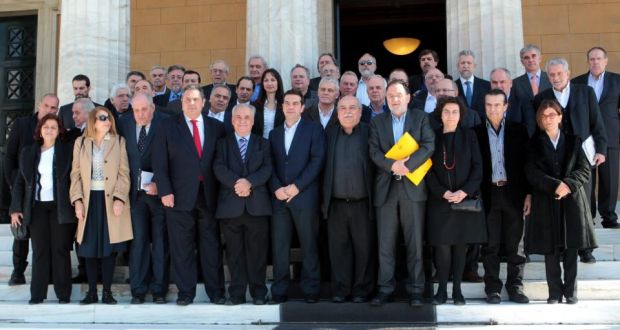
Source: Irish Times (2015)
This war cabinet, if we are to believe Varoufakis narrative, was initially nearly united in their negotiation stance. On their first day in office, Varoufakis had visited Tsipras, who told his inaugurated finance minister. “Listen! Don’t get comfortable in here. Don’t learn to love the trappings of office. These offices, these chairs, are not for us. Our place is out there, on the streets, in the squares, with the people. We got in to get a job done on their behalf. Never forget that this is why we are here. For no other reason. And be ready. If the bastards find a way to stop us from delivering what we promised, you and I must be ready to hand back the keys and get out on the streets again, to plan the next demonstration.” (pp.147-8)
Photo: Tsipras (left) and Varoufakis (right). Varoufakis’ wife, Danae Stratou, assured him in a phone call, “If Alexis and you stick together, you can do it.” Varoufakis remarks in his memoir, ‘To this day I think she was right’ (p.172).
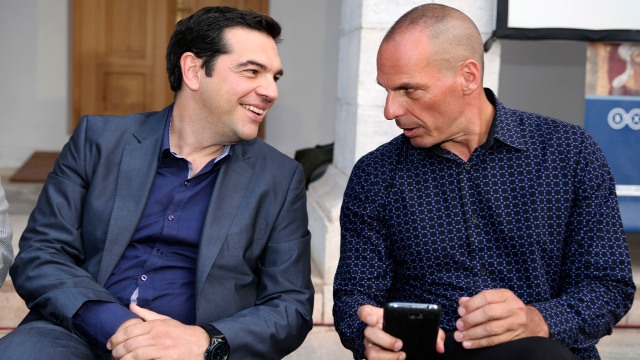
Source: Financial Times
The determination at the beginning was huge, especially among Tsipras, Pappas and Tsakalotos. Dragasakis, the deputy was wary of supporting a too aggressive stance against the quasi bankrupt Greek banks, which is the approach that Varoufakis would have favored. Chouliarakis, the economic adviser, was the most concessionary and had been temporarily removed by Varoufakis only to be restored at the end of April at the behest of the troika. Chouliarakis agreed with the unrealistic growth targets that the IMF and the troika had proposed, thus giving a blank cheque to the bailout-cum-austerity packages.
Varoufakis went to the European capitals to negotiate debt restructuring for Greece, but as the situation became more and more hopeless and the pressure against the Greek government increased substantially, Syriza’s high leaders gradually gave up. Tsipras, Pappas and Sagias backed Dragasakis and Chouliarakis in demanding a full-scale surrender to the bailout demand (the third one). Varoufakis still believed in getting a debt restructuring deal, and if threatened by the shutdown of the Greek banks (by the ECB refusing to release euros to the Greek banks) he would have liked to activate a parallel payment system, which works like an IOU for the duration of the bank shutdown. He would have also demanded the non-payment of the SMP (Securities Market Program) loan to the ECB. With such a tough negotiating stance he was hoping to avert a Grexit and get debt restructuring, though Grexit was still better than the Memorandum of Understanding (MoU, i.e. continue bailout-cum-austerity).
But as the political pressure on the Greek cabinet continued, Tsipras and his colleagues sidelined Varoufakis in favor of Tsakalotos to the relief of the Eurozone partners around April 27. (Ironically, Tsakalotos was the only major cabinet member to side with Varoufakis on policy, though he rarely spoke out in cabinet meetings and when he became finance minister he faithfully did his party’s bidding of surrender.) The final gamble happened as the Greek cabinet agreed to a bailout referendum to be put in front of the Greek people in July 5. The ECB, thus, shut down the banking system as the loans became due and as a political warning to the electorate that they should vote ‘yes’ to the referendum. The political leadership was fairly restrained (likely hoping to “lose” the referendum, i.e. a yes vote), though Varoufakis campaigned on a no vote. The voters voted no with 61.5% of the vote, thus defying the troika once again despite having gone through a week of closed banks.
Varoufakis pressed for the implementation of the parallel currency and cutting the ECB loans, but Syriza leaders would have none of it.
Tsipras and his inner circle panicked and decided to ignore the referendum results and sign the bailout agreement regardless. What a sham to call the referendum, when Tsipras did not care about the result except if he had “lost” it with a yes vote, which would have been easier on his conscience. But given that voters rejected the extend and pretend, the Syriza government was now in a position to openly have to betray the electorate that had put their trust in them. Tsipras noted in a conversation with Varoufakis that he was scared of a coup d’etat (p.469). But the more likely explanation (and here Varoufakis offers no more than speculation given that he can’t look into the mind of his boss) is that Tsipras and the inner circle were simply tired of half a year of bad news from the overpowerful troika, which seemed to hold all the cards in their hand. Better to capitulate and not face pressure from an intransigent troika and hope that the voters will put them back to power given that the political alternatives are even worse. Varoufakis compares his Syriza colleagues to Orwell’s 1984 character, who came to love Big Brother regardless of how oppressive he is (p.461).
Tsipras reasoning is quite bad because a Greek pensioner, who had seen his pension cut by 40%, will not care whether it is a Syriza or ND or PASOK or technocratic government which had imposed these cuts. It’s all equally bad. Unbelievably, when Tsipras called out snap elections in September 2015, his party was returned to power with the loss of merely 4 seats. There just wasn’t any alternative, but they had 300,000 fewer voters, which reflects a voter turnout that was 7 points lower (56%) than in January (63%).
Furthermore, Tsipras had offered Varoufakis another cabinet position (while pushing him out of the finance ministry), which Varoufakis rejected as he was no longer interested in participating in a government that would agree to extend and pretend, violating the original mandate of why voters would support Syriza. This is the final reasoning for Tsipras’ U-turn. While at the beginning he was skeptical about power, after having sat long enough in the prime minister chair he was beginning to become comfortable in power and did not want to leave. I doubt that if the elections were to happen again, he could rely on such broad electoral support. With the removal of Varoufakis, the prison rebellion was over.
Varoufakis has bitter memories of his Syriza colleagues, largely welcoming the hatred of the European establishment, but not easily accepting the self-undermining disunity of his own government. Martin Luther King said, “The ultimate measure of a man is not where he stands in moments of comfort and convenience, but where he stands at times of challenge and controversy.” We are all left-wing revolutionaries in our dream, but when David is fighting Goliath, will David hold onto his dream or surrender in the face of adversity?
The Foreign Front
Varoufakis at the beginning had the thankless task to negotiate with the Eurogroup finance ministers and the troika to get debt restructuring. Thanks to his rich account (again, very one-sided by definition as it is a memoir), we can paint the colors, i.e. who plays an important role in the negotiations and how could the troika view prevail?
I begin with Varoufakis’ allies, who used to work for the other side, and were thus steeled in their negotiation strategy: Elena Panariti, a former World Bank economist, who opposed the bailout and had experience in imposing austerity on other countries, thus being especially resistant to the ways of the troika (p.119). Natasha Arvaniti, a Greek civil servant and EU technocrat, who also gathered experience with the devastating troika policies. Glenn Kim was a banker, who was involved in the bond deals between Greece and the eurozone (p.120). The French investment bank Lazard led by Daniel Cohen and Matthieu Pigasse, who had charged the Greek state enormous sums for consulting on the second bailout, had a guilty conscience and lent a helping hand to Varoufakis (p.121).
Other useful friends were the former UK conservative Chancellor of the Exchequer, Lord Norman Lamont; Columbia University economist and World Bank economist in the 1990s when pushing for rapid privatization in Russia, Jeffrey Sachs; Thomas Mayer from the Deutsche Bank (one of the big beneficiaries of the bailout); former US treasury secretary and economic adviser, Larry Summers; US senator from Vermont, Bernie Sanders (who wrote letters to Fed chair Janet Yellen to demand an easing on austerity); and Texas economist and friend, Jamie Galbraith. Sachs accompanied Varoufakis to many meetings with high officials, and so did Galbraith. In addition, Galbraith also helped Varoufakis draft a parallel currency program, which ultimately was not activated.
There is another peripheral actor that is worthy to mention:
Emmanuel Macron, France’s economic minister, now president of France, made a very positive impression on Varoufakis, understanding the Greek plight and similarly advocating for an investment program that could help Greece and Europe end the financial crisis, regretting that he was the economy minister as opposed to the finance minister, where he could have done more to help Greece (p.191). In another important intervention in June 28, Macron wanted to travel to Athens to consult with Varoufakis and his government directly, and also tried to get president Hollande to intervene on behalf of Greece to avoid the bank shutdown. Hollande and other higher circles shut him down and cancelled his planned trip.
At a summit meeting he had argued that the troika deal with Greece was a “treaty of Versailles”, which resulted in Merkel calling on Hollande to neutralize Macron (pp. 453-4). Macron subsequently resigned from the socialist government in 2016, decided to run for president himself, won the election this year, and is slated to gain a landslide from the French parliamentary elections. Now, being on par with Merkel, it is questionable whether he can pursue such an aggressively pro-investment, anti-austerity agenda, especially given that his agenda is about slashing public employment, loosening labor protections.
Photo: Varoufakis (left) and Macron (right) meet a year after the end Varoufakis tenure, Macron running for president of France. Macron had a sympathetic ear to Varoufakis cause, but was rebuffed by Merkel after calling the troika agreement a “treaty of Versailles”
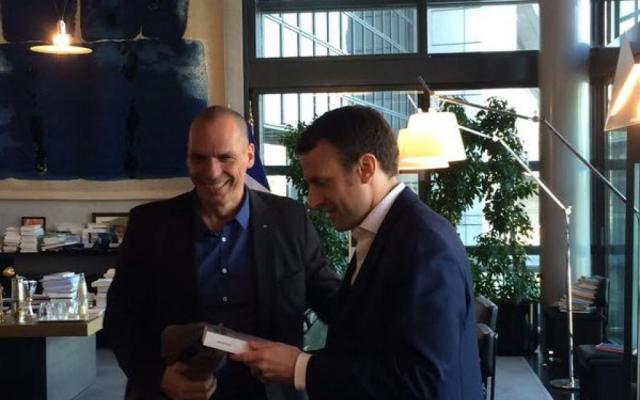
Source: Le Parisien
Now for the opponents among the troika (even as individuals within them were sympathetic to the Greek position):
The first part of the troika Greece faced was the International Monetary Fund:
Photo: Christine Lagarde (left), Yanis Varoufakis (center), Poul Thomsen (right): Lagarde was conciliatory in personal conversations but toed the line during the crucial Eurogroup meetings to demand more austerity, even as IMF-internal reports warned against it. Thomsen was less conciliatory, even though Wikileaks revelations show his own skepticism against the unrealistic growth target assumptions of Greece
Source: Aripaev
Christine Lagarde, leader of the IMF, former French finance minister, succeeded the disgraced Dominique Strauss-Kahn (at the IMF), who fell after a sex scandal. Lagarde had some sympathies for Varoufakis and Greece during their meeting, but was shot down by Thomsen. She was personally quite skeptical about the Greek ability for meeting its financial obligations and paying off the debt, falling in line with many IMF internal assessments that said the same. But, more importantly, during the negotiations, she deferred to the Eurogroup and the ECB. There is also incongruence in the IMF, namely that internal reports criticize bailout-cum-austerity while the IMF staffers on the ground promote it insistently. Lagarde only wants “adults in the room”, i.e. sign the MoU, give up, Yanis.
Poul Thomsen, director of IMF’s Europe department, was very strict in the personal conversations with Varoufakis and Lagarde, but in their first encounter, he was surprisingly open to lower primary surplus targets (which would make it easier for Greece to budget). He also favored debt cancellation and targeting tax evasion (pp.183-5). Though this never came through in the decision-making. He was responsible for creating unrealistic economic projections, which assumed high growth rates and thus make harsh austerity technically feasible. According to Wikileaks tapes, Thomsen has admitted to other staffers that the third bailout is not economically sustainable, and that the IMF’s economic projections were fallacious.
The second group included the Eurogroup, consisting mainly of finance ministers of the eurozone countries
Photo: Thomas Wieser (left), Jeroen Dijsselbloem (right). Varoufakis claims that Wieser was the real power broker making up policy in the background, while Dijsselbloem led the Eurogroup meetings and did the bidding of Wieser and Schauble (p.135).
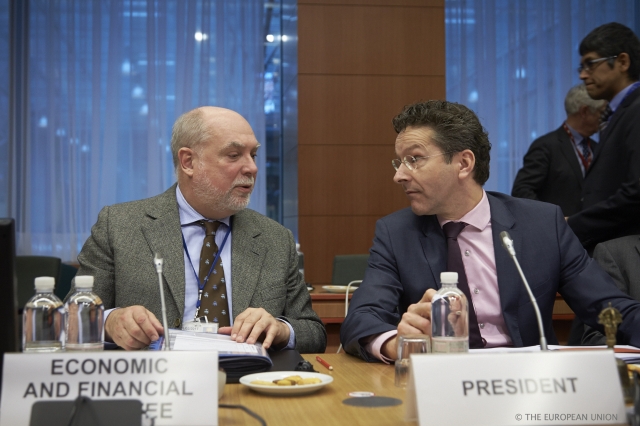
Source: TV News Room, Eurogroup
Thomas Wieser is the president of the Eurogroup Working Group. The Eurogroup Working Group is an advisory body to the Eurogroup finance ministers and is very influential in formulating policies. Wieser is an Austrian Social Democrat, but having worked in the banking sector most of his life has developed quite a favorable view toward repaying loans to the creditors in full. One exchange between Wieser and Varoufakis is noteworthy: Merkel had dispatched Wieser to chat with the Greek officials in Athens. Varoufakis noted that without EU funding, Greece would have to default on debt repayment, to which Wieser replied that Greece could last longer by plundering the reserves of pension funds, universities, utility companies and local authorities. Thus, more austerity please.
Jeroen Dijsselbloem is the president of Eurogroup finance ministers and Dutch finance minister. He has become well known for his encounter in February 2015 with Varoufakis in Athens. Dijsselbloem thought that he could bring the newly elected Syriza government to immediately cave in and accept the Memorandum of Understanding. “The current program must be completed or there is nothing else.” (p.162) During the press conference, Dijsselbloem insisted on the current program, while Varoufakis insisted on renegotiating the deal. Dijsselbloem then took of his translation device, leaned over and whispered in Varoufakis ear, “You just killed the troika.” (p.170)
Photo: Jeroen Dijsselbloem (left), Yanis Varoufakis (right): Dijsselbloem walks out of the press conference after whispering, “You just killed the troika.” Varoufakis replied, “Wow, this is an unearned compliment.”
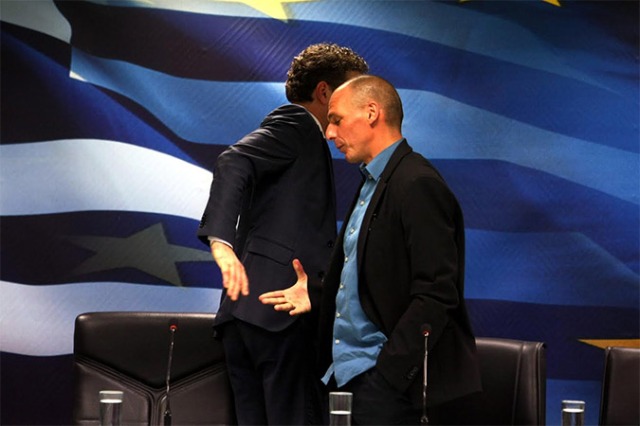
Source: Zero Hedge
Wolfgang Schauble, the German finance minister, is the most powerful finance minister in Europe. He is from the conservative CDU and the southwest German province of Baden-Wurttemberg, where Merkel’s famous and proverbial Swabian housewife lives and saves diligently. He is a lawyer rather than an economist and enjoys being the bad cop (p.210). The Eurogroup meetings are dominated by Schauble, who disciplines Greece and other peripheral Eurozone countries to keep their deficit in line and enforce austerity. His natural allies are the Austrians, Dutch, Maltesians, Belgians, Luxembourgians, Finns, Latvians, Estonians, Lithuanians, Slovakians, Slovenians, Porguguese who agree with Schauble on all policy statements. The recipients of discontent are the Irish, Italians, Spanish, Greek, Cypriots and to a smaller extent the French. The latter group, however, rarely dared to speak up for Varoufakis, because they feared rebuke from Schauble and were also concerned that if the Greeks got a debt restructuring the left in their own country would throw them out of office for not having gotten such a debt restructuring themselves.
Varoufakis writes,
While some, including the Lithuanian, Slovakian and Slovenian finance ministers, clearly believed Schauble’s pronouncements on economic policy to be sound and self-evident, it became apparent that even those who disagreed with the economics of austerity would support him- in the case of Italy, Spain and Ireland out of fear that upstart Greece might escape having to do what they had been forced to do already, in which case their own people might demand to know why they had not resisted austerity too- and in the case of a small but significant group, with France at its centre, out of fear that Schauble would force austerity upon them in the future if they undermined him. (p.237)
I quote Varoufakis on the seating arrangements in the Eurogroup meetings:
At one end, to my left, sat the Eurogroup president, Jeroen Dijsselbloem. On his right was Thomas Wieser, the Eurogroup Wirking Group president and the real power at that end of the table; on his left were the IMF representatives, Christine Lagarde and Poul Thomsen. At the other end of the table was Valdis Dombrovskis, commissioner for the euro and social dialogue, whose real job was to supervise (on behalf of Wolfgang Schauble) Pierre Moscovici, the economic and financial affairs commissioner, who sat on the Latvian’s left. On Dombrovskis’s right, meanwhile, sat Benoit Coeure and beyond him Mario Draghi representing the ECB.
At the same corner of the table as Draghi, but on the longer side at at right angles to him, sat Wolfgang Schauble. Their proximity would on occasion give rise to intense heat, though never any actual light. Along the same side as Schauble were what I came to see as his cheerleaders: the Finnish, Slovakian, Austrian, Portuguese, Slovenian, Latvian, Lithuanian, and Maltese finance ministers. My seat was almost diagonally opposite Schauble’s, alongside the other profligates, nicely lined up together: to my left was Ireland’s Michael Noonan, to my right Spain’s Luis de Guindos, and next to deGuindos was Italy’s Pier Carlo Padoan. France’s Michel Sapin also sat on our side, next to Padoan. (p.232)
When Varoufakis proposed the debt swap agreements to lighten the Greek debt, Schauble did not even consider this proposal deferring to the “institutions” (troika). Schauble in a personal meeting with Varoufakis, however, noted his preference to solve the Eurozone crisis and end the extend and pretend primarily via a Grexit. Varoufakis opposed Grexit because the reintroduction of the drachma would be like announcing a currency devaluation a year before it happens, giving Greeks enough time to withdraw all their euros and keep them in a northern European bank account.
The chaotic shift of currency would require the Greek government to impose stringent capital controls, which would create a painful short-term economic uncertainty. Though he also thought it was better than the alternative of continuing extend and pretend. Schauble would have favored a little break for the Greeks, leave the currency for a while, get their household finances in order and then return back to the euro at a later point. When Merkel had heard of Schauble’s plans she immediately rejected it. Schauble, thus, had his hands tied and ultimately pressed Varoufakis for the signing of the MoU. In a notable exchange between Schauble and Varoufakis the latter asked whether Schauble would have signed the MoU as Greek finance minister. “As a patriot, no. It’s bad for your people.” (p.413)
Photo: Varoufakis (right) visits Schauble (left) in Berlin in February 2015. Schauble- the most powerful European finance minister- said, “We agreed to disagree.” Varoufakis replied, “We didn’t even agree on that.” (p.213) Schauble favored Grexit, but was overruled by his boss, chancellor Merkel.
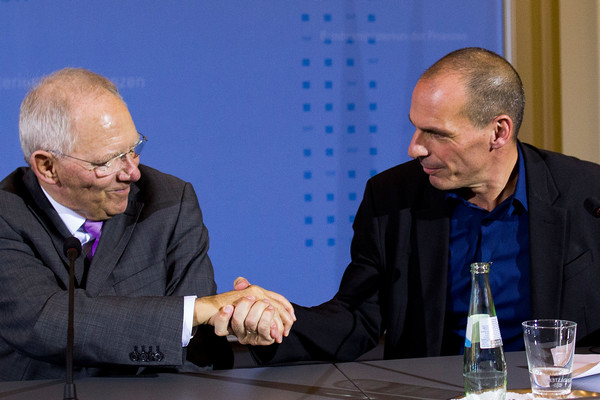
Source: Zimbio
Michel Sapin, the French finance minister, was ideologically siding with Greece, but only behind closed doors. In a personal meeting with Varoufakis, Sapin confided, “Your government’s success will be our success. It is important that we change Europe together; that we replace this fixation with austerity with a pro-growth agenda. Greece needs it. France needs it. Europe needs it.” (p.188). But when Sapin and Varoufakis appeared for the press conference, Sapin’s tone changed and he admonished Greece for not being earnest enough in applying austerity. Varoufakis was shocked. Sapin did not want to cross the Germans by being too helpful to the Greeks.
Photo: Varoufakis (left) visiting his colleague Sapin (right) in Paris, heading in brotherly connection to the common press conference, where Sapin surprised Varoufakis with calls for austerity contrary to what he said in their tete-a-tete conversation. “Who are you and what have you done to my Michel?”, Varoufakis asked his colleague after the press conference. “Yanis, you must understand this. France is not what it used to be.”
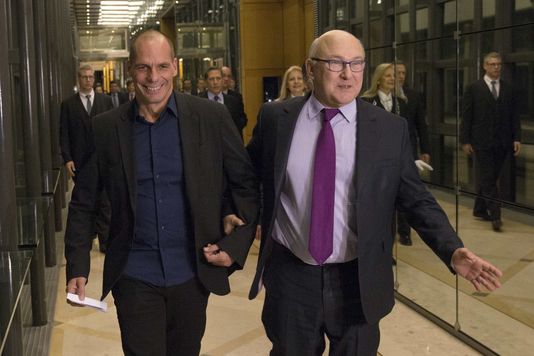
Source: LeMonde
Sapin also confessed to Varoufakis that he did not know much about economics and wrote his postgraduate thesis on the “numismatic history of Aegina” (coins in ancient Greece). During Varoufakis’ first Eurogroup meeting, Sapin briefly defended the Greek proposals, but then was shut down by Schauble, who replied, “Elections cannot be allowed to change economic policy.” (p.237)
Angela Merkel, the federal chancellor of Germany, is not a member of the Eurogroup and is hereby listed as the only head of government in Europe, because of her influence and power. The Eurogroup finance minister meetings are led by her colleague Wolfgang Schauble, but given that the two disagree on the handling of Greece, she deserves a special mention. It was her intervention that ensured a February 20 agreement to extend the Greek loans (which would otherwise have resulted in bank closures in February as opposed to July) and blocked Schauble’s Grexit proposal, as she was more concerned about holding the currency union together at all political/ economic costs, even if it meant more bailout-cum-austerity. Varoufakis claims that Tsipras became too overreliant on Merkel’s help, though it can ultimately not be established what happened in the interactions between Tsipras and Merkel, as he only had personal dealings with Schauble. Even today, with Varoufakis gone and replaced by Tsakalotos the same pattern emerges: Tsipras intervenes personally to get Merkel to make concessions to Greece while she defers to her finance minister (Spiegel 6/14/2017).
Photo: “Will she give us a good deal?, ” PM Tsipras might wonder, expecting favorable treatment from the most powerful European leader, chancellor Merkel. While considering an alliance with Merkel crucial to overcome Schauble’s intransigence in the Eurogroup, Varoufakis also viewed Tsipras overreliance on Merkel problematic, which Varoufakis also partly blamed for Tsipras surrender after the bailout referendum (see p.250).
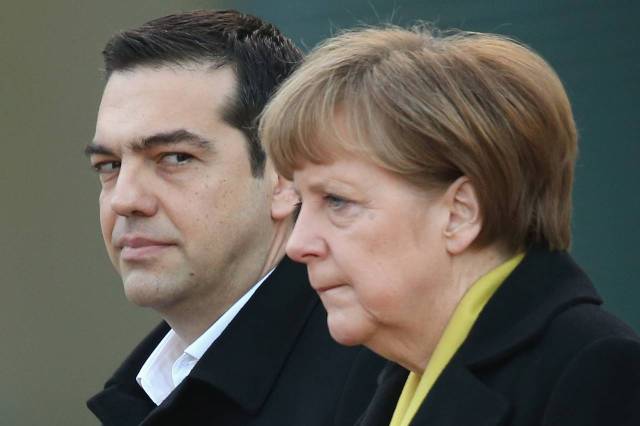
Source: Wall Street Journal
The second part of the troika consist of the European Central Bank:
Photo: The official photo of the European Central Bank Executive Board. Front row from left: Sabine Lautenschlager (Germany), Mario Draghi (Italy; President), Vitor Constancio (Portugal; Vice President). Back row from left: Yves Mersch (Luxembourg), Peter Praet (Belgium), Benoit Coeure (France). In Varoufakis’ account, only Draghi and Coeure figure prominently, with the former being stiff, formal and dismissive, and the latter being warm and sympathetic, at least behind closed doors
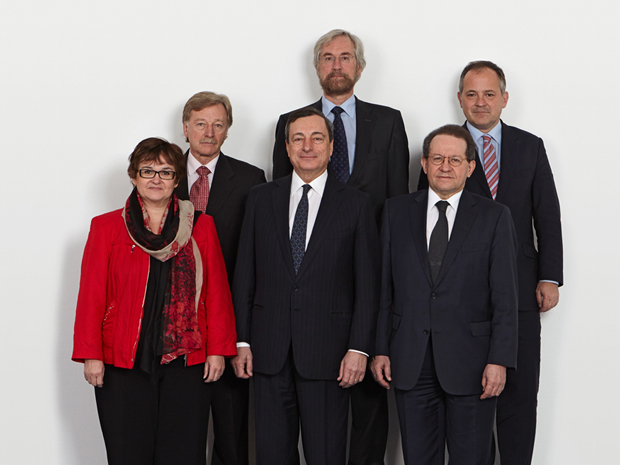
Source: ECB
Mario Draghi, chairman of the ECB, former Goldman Sachs banker and chairman of the Bank of Italy, presented himself as a technocrat, who was not making political decisions which would be left to the Eurogroup, when in fact his decision to launch the QE bond-buying program and the refusal to extend liquidity to Greek banks, which forced the shutdown of their banks, due to the unwillingness of Varoufakis to sign the MoU, are deeply political interventions. Draghi had no interest in debt swaps, and when pressured deferred to the ECB Governing Council which tied his hands in making decisions.
While going out for dinner with two German officials, Varoufakis received a phone call from Draghi. “Hello Mario, what can I do for you?”
“I wanted to let you know, Yanis, before you learn it from the media, that as I foreshadowed this morning, the Governing Council voted to withdraw your banks’ waiver [which foreshadowed a bank run]. But this does not mean much since your banks will continue to be supported by your central bank via emergency liquidity assistance, ” Draghi reported on the phone (p.207). The waiver was restored after the February 20 agreement, which continued liquidity and continued financing until the July shutdown of the Greek banks.
Benoit Coeure, is the French member of the ECB executive board, and in private meetings was very “mild and agreeable” (p.185). He also entertained the debt swap proposal that Varoufakis put forward in a private meeting (p.186). During the meeting with the ECB board, Coeure also lobbied Draghi to take seriously the debt swap proposal, which Draghi ignored by changing the subject (p.204). In another personal encounter, Varoufakis told Coeure that he would activate the parallel payment system in case of the ECB denying liquidity to the Greek central bank, and Coeure thanked him for telling him this and promised to ask the EU council to push for more favorable monetary action to give the Greek government more breathing room (pp.382-3). It went nowhere because even as the Greek banks were denied liquidity, the Syriza government refused to entertain the parallel payment system and instead capitulated to the demands of the troika.
In the decisive Eurogroup meeting on 18 June, Draghi and Coeure both conspired to worsen the bank run that was building up in Greece.
Nothing speeds up a bank run more effectively than a central banker [Draghi] reciting its progress while his deputy [Coeure] signals their intention not to intervene except perhaps by closing the banks in three days’ time. (p.430)
A minor set of actors were the EU commissioners, as they had very little practical input in policymaking, and their conciliatory tone with Greece was overruled by the more powerful Eurogroup (p.262). (Ironically, the EU commission is counted as third part of the troika, though in Varoufakis’ account it is the Eurogroup which holds the practical power.)
Photo: Jean-Claude Juncker (left) greets his commission colleague Pierre Moscovici: both commissioners favored a conciliatory approach with the Greek government, but were shot down by the Eurogroup that called all the shots whenever they tried to be of help.
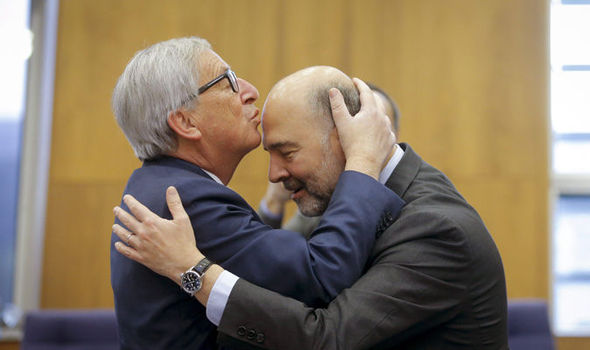
Source: Daily Express
Jean-Claude Juncker, the president of the European Commission, was personally very sympathetic to Syriza’s cause, having issued a draft communique, which read that “the economic and social impact of the crisis on Greece and its citizens has been immense” and that “there is a need to move to a new relationship based on a mutually beneficial agreement for Greece and for Europe as a whole” (p.257). Juncker’s message also demanded a restoration of liquidity for the Greek banks and an end to troika officials unilaterally imposing humiliating policies as if Greece were a minor colony. In late June, right before the bailout referendum and the bank shutdown, Juncker issued another communique, which approved of the Greek debt swap proposal, but that was shelved either by the Eurogroup or by the Greek government ministers willing to capitulate (pp. 452-3).
Pierre Moscovici: The Frenchman is the EU commissioner for Economy and Finance, and has also been sympathetic to the Greek cause, endorsing the Juncker communique. Varoufakis was gleeful, but soon realized that without Dijsselbloem’s and especially Schauble’s support the communique is as valuable as a white paper in an obscure academic journal. Moscovici and Varoufakis took the communique into Dijsselbloem’s office, who had no interest to entertain the commission communique and instead submitted the MoU proposal to Varoufakis. The following scene is best quoted in full,
Turning to Pierre [Moscovici], who was already looking downcast, I asked what was going on. “You just showed me a draft communique that I was happy to sign on the spot. You are the EU’s commissioner for economic affairs. I am the finance minister of a stricken EU member state. Can I please have some clarity from the only person in this room that has official status to represent the EU.”
Without looking at me, Pierre turned to Jeroen and made his first and last attempt to salvage the European Commission’s dignity. “Can we combine some of the phrases in your draft and this?” he implored in a broken voice, pointing at the draft he was holding in his right hand.
“No!” Jeroen cut him down with what could only be described as controlled aggression. “Everything that could be taken from the draft has been taken”, he stated categorically.
…
“Pierre”, I asked, “are you just going to submit to the enforcement of this totally one-sided communique against the commission’s views and the draft that you prepared?”
Avoiding eye contact and in a voice that quavered with dejection, Pierre responded with a phrase that might one day feature in the European Union’s tombstone: “Whatever the Eurogroup president says.” pp.260-1
Moscovici also assured Varoufakis to speak with Coeure to find a more conciliatory position on ECB liquidity, which resulted in a phone call between Coeure and Varoufakis, promising potentially some higher intervention favoring Greece (p.382). Varoufakis ultimately compared Moscovici with Sapin: sympathetic but helpless and without ideas themselves (p.404).
Declan Costello: EU commission mission chief for Greece did not figure prominently in Varoufakis’ account, but was described as a hardliner on indebted countries. He was in charge of drafting the Memorandum of Understanding, or the pretend and extend list.
Conclusion
Varoufakis’ memoir is a true tragedy, as many political actors, especially the French ones (Lagarde, Sapin, Moscovici, Macron, Coeure) were rather favorable to the negotiation position of his government, which was made abundantly clear in tete-a-tete exchanges behind closed doors. But none of these actors could dare to go against the overarching logic of the troika, and the politically short-sighted logic that ending the bailout scam could reveal the stupid criminality of officials, who had decided to save their banks and cover it up from their own taxpayers. Ending the austerity scam could have also exposed countries that have undergone harsh austerity or might face it in the future as too weak to resist the unreasonable demands of the troika. In a true tragedy, the outcome is not only bad, but the actors in it know the consequences of their actions, but still can’t depart from the already reached consensus.
If there is to be any realistic hope to resolve the Greek debt crisis the leaders will be forced to accept a different paradigm, revolving around either a painful Grexit or debt restructuring. We might hope that another political faction rises up in Greece to replace Syriza, which is rather unlikely, and the Greek suffering had increased in the mean time such that it will be harder to face another period of financial uncertainty for pensioners, workers and unemployed Greeks that had lost so much. The uncertainty in Greece, which the bailout-cum-austerity agenda enforces, is also applicable for the Eurozone taxpayers, as Greece will be expected to request a fourth bailout with which to repay the loans from the third bailout that they were in no better position to afford back then.
Varoufakis has gone on to help found his own left-wing political party (DiEM25), which is designed as a pan-European movement to demand an end to austerity, debt restructuring in the weak economies, a new investment agenda, better social and workers’ rights, higher taxes on companies and the wealthy and, most importantly, democratic accountability and transparency for the ruling political class. With this book Varoufakis has made a contribution to the latter demand to an extent that is unusual for a person who had been in power. He also shows that it is possible for a political outsider to be in a position in power, even though the actual policy changes are not there. While participation in the levers of power for the good has to be lauded and encouraged, Varoufakis ultimate political failure rests from the inability of the political left to mobilize on a united front to challenge the European technocrats, who have made a sham out of democracy, and made the Brexit decision even somewhat plausible. One can only wish the best to DiEM25.
As my book report has taken on mostly positive tones (as I don’t hide my left-wing sympathies), I have to address an important and valid objection: how can one make valid conclusions about the actors in the Eurozone tragedy when these descriptions all come from one person’s account? To make valid statements for scholarship or even investigative journalism one has to corroborate these accounts by reading all the accounts, including from people that were described by Varoufakis and may appear in a very negative light. That would certainly be a worthy project and would require me probably to devote an entire career to study the Eurozone crisis as opposed to reading a book in a few days. I certainly don’t deny that the Varoufakis story has to be read with a grain of salt.
But to be fair there are not many comprehensive accounts of the Eurozone crisis. What we have instead are the purely academic perspectives that are focused on broader political economy patterns (as opposed to the daily minutiae of actors making political decisions) or are only relevant in econometric, economic and finance journals, or the journalistic encounters with meaningless statements of political leaders made in rehearsed press conference settings. In the absence of having a ubiquity of smart people within the circles of power narrating how the architecture of power works (think of John Perkins “Confessions of an Economic Hit Man”) while eschewing the unreasonableness of a conspiracy theory, Varoufakis’ account remains an important contribution to the public understanding of the Eurozone crisis.
In a telling encounter, Larry Summers told Varoufakis that he better choose whether he wants to remain a political outsider, where he can say whatever he wants but does not get heard by people in power, or a political insider, who will get heard by the powerful and might be able to change the outcomes, but cannot tell on insiders or criticize them behind their back. For six months of his life Varoufakis accomplished the rare feat of being a political insider while having been a political outsider all along. Government insiders are trying all they can to squash any attempt to inform the masses about what’s happening inside the circles of power, see the continuing prosecution of Wikileaks founder Julian Assange. As Congressman Charles Binderup (1937) said in a paraphrase of Henry Ford, “It is perhaps well enough that the people of the Nation do not know or understand our banking and monetary system, for if they did I believe there would be a revolution before tomorrow morning.”
Assange and Varoufakis are radicals to the extent that their efforts are reducing the distance between the rulers and the ruled, thus making the distinction between the political insiders and outsiders less relevant (for how could there be insiders if governance is made transparent to the public). That is a threat to any ruling class. We owe individuals like Varoufakis or Assange a great deal of gratitude for insisting on leaders to be accountable to a public that has confided in its leaders to watch over it.


Varoufakis’ doom-and-gloom predictions about what would happen to the Greek economy with a third memorandum turned out to be completely wrong. The economy grew and SYRIZA managed to expand health care access for the poor and carry out a number of progressive measures despite the Troika’s suffocation efforts. So far, he has refused to acknowledge his error or give credit to Tsipras for refusing to go down a blind alley of issuing IOUs in lieu of Euros and turning Greece 2015 into Venezuela 2017.
Pingback: Lafontaine: The Charismatic Politician | Mr Liu's Opinions